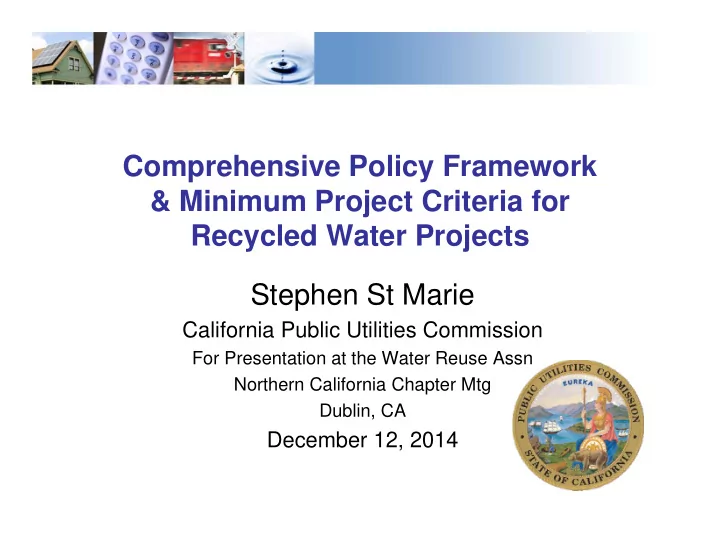

Comprehensive Policy Framework & Minimum Project Criteria for Recycled Water Projects Stephen St Marie California Public Utilities Commission For Presentation at the Water Reuse Assn Northern California Chapter Mtg Dublin, CA December 12, 2014
What is this all about? Through this decision, the CPUC set out to reduce barriers to our jurisdictional water and sewer utilities’ development of recycled water. The decision provides guidance and explains what the utilities should provide to support projects; guides the Commission itself on appropriate costing and accounting; and it reduces regulatory barriers. It provides a green light to recycled water. 2
What We Will Cover Today • Everything in this presentation will be found in Decision D.14-08-058 of Rulemaking R.10-11-014 • Background and Policy Framework • Guidelines for Ratemaking Treatment • Minimum Criteria Requirements • Regulatory Process 3
Background and Policy Framework • Consistent with CPUC Core Principles and Objectives • Consistent with PU Code Section 451 • Work with SWRCB and CDPH • Develop Public-Private Partnerships • Increase the use of Recycled Water • Increase the use of Recycled Water • Increase the use of Recycled Water 4
CPUC Principles and Objectives Principles • Safe, high quality water • Highly reliable water supplies • Efficient use of water • Reasonable rates and viable utilities Objectives • Maintain highest standards of water quality • Promote water infrastructure investment • Streamline CPUC regulatory decision-making • Set rates that balance investment, conservation, and affordability 5
Public Utilities Code § 451 Obligation to serve … furnish and maintain such adequate, efficient, just, and reasonable service, instrumentalities, equipment, and facilities … as are necessary to promote the safety, health, comfort, and convenience of its patrons, employees, and the public. 6
Additional Policy Guidelines (Requirements) • Comparative Analysis of Recycled Water Energy Costs and Savings • Comparative Analyses of Greenhouse Gases • Recycled Water Project Environmental Review Requirements • Integrated Regional Water Resource (IRWR) Management Planning • Monitoring Recycled Water Technologies and Regulatory Developments • Public Funding for Recycled Water Project Costs 7
Guidelines for Ratemaking Case-by-Case Evaluation because of the wide range of variables associated with: • Recycled water project costs • Project funding and partnerships • Customer infrastructure costs and incentives Also needs a determination of: • Allocation between potable and recycled water customers • General metered service or surcharge • Benefits over the customer base / area / region 8
More Guidelines • Recycled Water Utility Plant Investments Made by IOWSUs should be afforded Rate Base treatment – Also, consistent with accounting rules: Contributed Plant • Evaluating Customer Incentives for Recycled Water Service – Potential discounts, recoverable – Customers may need to make infrastructure investments • Recycled Water Project Costs should be Recovered from Recycled and Potable Water Service Customers – Benefits may go beyond the direct recycled water users • Public Education 9
Minimum Criteria Requirements Decision Attachment “A” Requires a “thorough showing” • Background, general info, history, status, location, etc. • Need – current cost and availability of potable water, demand for recycled water, displacement, impact on supplies • Structure of the transaction • Project Cost-Benefit Analysis • Supply potential 10
Minimum Criteria Requirements Decision Attachment “A” Requires a “thorough showing” … Continued • Incentives to customers – discounts, rates, factors to establish incentives • Due Diligence on Recycled Water Supply and Efforts to seek a public partner, public funds, etc. • Project Cost Breakdown • Revenue Requirement, Rates, Rate Design • Environmental Review, Permits, Certifications 11
Lightened Regulatory Process “To lessen the processing steps and time required … we adopt a Tier 3 advice letter process and template. To qualify … the proposed recycled water project must” 1. Have a revenue impact of less than 5% of revenue in the ratemaking area 2. Not require NEPA or CEQA review, or the lead agency must have completed and certified NEPA/CEQA 3. Not require direct potable reuse as defined Details in Decision Attachment “B” 12
Lightened Regulatory Process “We will continue to use the Tier 2 advice letter process for the review of recycled water project proposals that have no impact on IOWSUs’ revenue requirement and on potable customers’ rates in the service area where the project is proposed in accordance with PU Code Section 455.1 as discussed” That is, in the absence of a protest, automatic rate adjustment after 40 days. A protest calls for a hearing and a discretionary finding of justification of a rate change 13
Summary “This decision adopts the Commission’s policy framework for the production, distribution and use of treated municipal effluent by investor- owned water and sewer utilities and provides minimum criteria requirements both for applications that seek approval for larger recycled water projects and for advice letters relating to smaller size recycled water projects” 14
The Disclaimer This presentation was prepared by California Public Utilities Commission (CPUC) staff. It does not necessarily represent the views of the CPUC, its Commissioners, or the State of California. The CPUC, the State of California, its employees, contractors, and subcontractors make no warrant, express or implied, and assume no legal liability for the information in this presentation. It has not been approved or disapproved by the CPUC, nor has the CPUC passed upon the accuracy or adequacy of the information in it. 15
Thank you! For Additional Information: www.cpuc.ca.gov Stephen St Marie stephen.st.marie@cpuc.ca.gov 415-703-5173 16
Recommend
More recommend